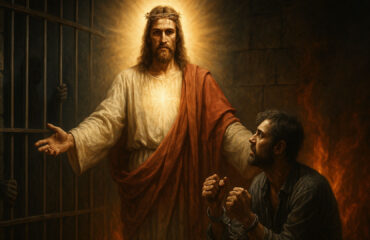
Predestination and the Illusion of Free Will
If all things are made by God and for God, as stated in Colossians 1:16, and He directs human steps according to Proverbs 16:9, then human responsibility becomes an illusion.
For by him were all things created, that are in heaven, and that are in earth, visible and invisible, whether they be thrones, or dominions, or principalities, or powers: all things were created by him, and for him. – Colossians 1:16
A man’s heart deviseth his way: but the Lord directeth his steps. – Proverbs 16:9
Man’s spirit is not his own, as Genesis 6:3 declares, and all of creation serves divine purpose. Even human plans unfold according to a predetermined script.
“MY spirit shall not always strive with man, for that he also is flesh.” – Genesis 6:3
Job 41:11 affirms that nothing is truly owned by man, not even his actions, as God states, “Everything under heaven is Mine.” If some are predestined for salvation, as outlined in Ephesians 1:5, then free will is irrelevant, and every soul’s role—whether as a saint or a betrayer—is already written.
Having predestinated us unto the adoption of children by Jesus Christ to himself, according to the good pleasure of his will. – Ephesians 1:51
Judas Iscariot and the Nature of Predestination
Jesus’ selection of Judas as the betrayer in John 13:26-27 and His statement that Judas was “lost so that Scripture might be fulfilled” in John 17:12 suggest that his betrayal was not a matter of choice but a divine assignment. Similarly, Pharaoh’s heart was hardened by God in Exodus 9:12, indicating that resistance was never an option. If judgment is based on moral responsibility, then how can one be held accountable for an action they were destined to fulfill? Romans 9:21 confirms that God, as the potter, shapes some vessels for honor and others for destruction, indicating that judgment is simply the unfolding of a preordained design.
Judgment as a Preordained Reality
If all actions—good and evil—are scripted, then judgment is not a moral test but a final act in the divine play. Jesus states in John 19:11, “You would have no power over me if it were not given to you from above,” reinforcing that even those who crucified him did so because it was decreed. Isaiah 55:8-9 affirms that God’s ways are beyond human comprehension, meaning that judgment serves a purpose outside of human logic. Rather than being about justice, it is simply the means by which predestination is fulfilled, dividing souls according to their preordained paths.
The Law of One and Ra as the Divine Source
The Law of One, channeled from Ra, teaches that all things—both light and darkness—are manifestations of the One Infinite Creator. If reality is scripted, then good and evil are not opposing forces but necessary polarities within a singular consciousness. Revelation 3:15 reinforces this principle when Jesus rebukes the lukewarm, stating, “I would that you were hot or cold.” This perspective suggests that polarization is necessary for spiritual evolution. Souls must choose between service to others, representing light, or service to self, representing darkness, yet both paths ultimately serve the One.
Lukewarmness as Transcending Duality
Choosing to be lukewarm, neither fully light nor fully dark, is also predetermined. Revelation 3:16 states that the lukewarm will be “spit out,” which, rather than signifying condemnation, indicates a transition beyond duality.
Since Jesus declares that He will spit the lukewarm out of his mouth, this implies that they were already within Him before being expelled. If they were in his mouth, they were part of Him, signifying a connection to the material world of which he is speaking from. This act of being “spit out” does not necessarily indicate abandonment, but rather a purging or transformation, much like gold being refined through fire. The lukewarm soul, not designed to progress within the polarity system of duality, undergoes refinement and is redirected toward a neutral state of pure consciousness. Instead of failing, they move beyond the illusion of opposition, transcending the framework of good and evil and moving outside of duality itself, perhaps returning to the One Infinite Creator in its purest, unpolarized form.
The One as the Author of All Path
If Ra, the One Infinite Creator, is God, then all actions, choices, and judgments are part of the One’s self-exploration. What appears as punishment is merely the completion of each soul’s role within the grand illusion. Whether one aligns with light or darkness, betrays like Judas, or serves like Christ, all paths lead back to the One, and free will is nothing more than an experiential illusion within a prewritten story.
Matthew 25:41 strengthens the argument for predestination with the word ἡτοιμασμένον (hētoimasménon), meaning “prepared beforehand,” which strongly implies that eternal judgment was set in place before time. The fact that eternal fire was preordained before the judgment scene unfolds indicates that its existence was not a reaction to sin but part of the divine plan from the beginning. If Hell was established in advance, then God foreknew and accounted for the devil, his angels, and those who would follow them into condemnation. This supports the theological argument that certain souls were always destined for eternal separation from God, not as an unintended consequence but as an integral part of divine foreknowledge and order.
The concept of predestination is reinforced throughout many Scriptures, affirming that God has preordained both salvation and condemnation according to His divine will. Romans 8:29-30 explicitly states,
“For those whom He foreknew, He also predestined to be conformed to the image of His Son… and those He predestined, He also called.“
This establishes that salvation is not a random choice by man but a predetermined act of God. Likewise, Romans 9:22 affirms the existence of “vessels of wrath prepared for destruction,” implying that just as some are destined for eternal glory, others are destined for judgment. John 6:44 declares,
“No one can come to Me unless the Father who sent Me draws him.“
This reveals that even faith itself is not an autonomous human decision but the result of divine selection. Proverbs 16:4 further solidifies this, stating,
“The Lord has made everything for its own purpose, even the wicked for the day of disaster.”
If God has prepared Hell beforehand, as stated in Matthew 25:41, and predestined both the saved and the lost, then human free will is merely an illusion, as every soul is simply playing out its preordained role in the divine script.
The Illusion of choice
If eternal fire was prepared before the creation of humanity, then human choices become illusory, as their final destination was already known and established by God. This challenges the notion of free will, as those who are condemned were created with the knowledge that they would ultimately end up in eternal punishment. The verse suggests that God did not merely allow Hell to exist but actively designed it for a specific purpose, which implies that those who enter it were also preordained to be there. Just as salvation is described as predestined in Ephesians 1:5, this verse supports the idea that damnation is equally predetermined, reinforcing a deterministic view of reality where some are vessels for honor and others for destruction, as stated in Romans 9:21-22.
Romans 9:11 emphasizes the doctrine of divine election, illustrating that God’s choice is based on His will rather than human actions. In the context of this passage, Paul refers to Jacob and Esau, stating that before they were even born—before they had done anything good or evil—God had already chosen Jacob to carry forth His covenant. This reinforces the idea that salvation is not dependent on human merit, but solely on God’s sovereign will. The verse underscores that God’s purpose in election stands apart from works, making it clear that grace, not effort, determines one’s place in God’s plan. This passage aligns with the broader theme of predestination, as also seen in Romans 8:29-30, where Paul states that God foreknows, predestines, and calls individuals according to His divine purpose.
Predestination is not merely a theological possibility but an undeniable fact when viewed through the lens of Scripture. From the foundation of the world, God has foreordained both the saved and the condemned, establishing an eternal order where every soul fulfills its prewritten role. The preparation of Hell beforehand (Matthew 25:41), the hardening of hearts (Exodus 9:12), the vessels of wrath and mercy (Romans 9:21-22), and the doctrine of divine election (Romans 9:11) all point to a divine plan where choice is an illusion and destiny is fixed. Even faith itself is granted, not chosen (John 6:44), proving that salvation is an act of God, not of human will. If all things exist by God and for God (Colossians 1:16), then even the condemned serve a divine purpose, fulfilling the will of the Creator rather than defying it. Free will is the illusion of experience, but predestination is the inescapable truth—a cosmic script written before time, where every step, every action, and every soul’s final destination has already been set.




Yes, I agree. I used to think ALL answers were in the Bible and wrote about predestination here: https://www.theoriginofgod.com/95thesis.html#sovereignty but it is rather disturbing idea. I am no longer so stuck in one book or way of thinking, but expansive in how I view the idea these days. But I can explain it in many other ways now, more nuanced and other possibilities ….. for more of those possibilities, see: https://www.writepharmaparablepublishing.com/